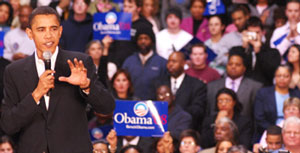FCNNEWSSOURCE

Sen. Barack Obama has already made history by winning enough pledged delegates and commitments from super delegates to capture the Democratic Party nomination and enjoys the possibility of becoming the first Black man to serve as president of the United States.
His success engenders a sense of pride among Blacks in America and excitement throughout the world as a nation that touts itself as a great democracy provides another sign of progress. In a country where Africans were once enslaved and their children denied the right to vote, the son of an African father may soon be elected leader of the free world.
Mr. Obama has exhibited a demeanor and espoused a message that has appealed to millions of Americans and been applauded around the globe as people hunger for change and an end to the arrogance and warmongering of President George W. Bush.
The United States needs to change, needs a new day in politics and a departure from the politics of personal destruction, partisanship and roughshod imperialism. The country faces serious economic, social and spiritual challenges and visionary leadership is required to guide America through these troubled times. As the Honorable Minister Louis Farrakhan noted, it is not enough to solely cling to “experience” as the saving grace of this nation because America faces times she has never faced before.
The next American president, whoever that may be, should be a person of vision and courage.
In the Bible and the Holy Qur’an, pharaoh had troubling dreams and called on Joseph to interpret his visions and provide sound advice about how to conduct the affairs of the nation. Americans are worried about where the country is headed and wonder if the good days are long gone. Americans are so worried that, like pharaoh, many are willing to look in unlikely places for solutions to problems.
Mr. Obama’s victory is a sign of a measure of racial progress in America, but his success is not proof that the country is past its historic problems with race. Vicious threats, a hardcore “I’m-not-voting-for-a-Black-man” segment of American voters, subtle and overt racial appeals during the Clinton campaign and a tight rope walk to reassure White voters shadowed Mr. Obama during the primary. Mr. Obama could not appear overly “Black” even in his June 3 speech as he captured the numbers needed to win nomination. He was able to pay tribute to the historic nature of Sen. Clinton’s run as a woman and gender progress, but had to avoid any talk of the historic racial significance of being the first Black presumptive nominee for president.
Black disparity with Whites in life expectancy, income, health, education, wealth, incarceration, poverty, infant mortality and HIV infection rates–in which Blacks negatively trail Whites or suffer more ills than Whites–have not gone away. Nor will they disappear simply because Mr. Obama walks into the White House.
A sign is defined as “a token; indication,” “any object, action, event, pattern, etc., that conveys a meaning.” While Mr. Obama success is an indication of something that contains a significant meaning, his political ascension does not signal widespread equality of opportunity, an end to racial discrimination and oppression or an end to White uneasiness with Black men.
Despite the talk of Mr. Obama “rising above race,” his campaign has skillfully avoided race and racially charged issues with a broad appeal to unity and national advancement. The fact that race could not openly and honestly be discussed and Mr. Obama’s careful positioning to avoid threatening White voters prove America still must travel some distance to achieve racial reconciliation.
The primary election decision by Democratic voters could present America with another opportunity to take steps in a positive direction by making a choice about Mr. Obama’s fitness for office based on the content of his character. Sen. John McCain, Mr. Obama’s Republican opponent, has made some outreach to Black voters and has pledged to do more. His actions and words are much different than some of his Republican predecessors. Maybe that’s a good sign, too.
If voters can cast their votes in November based on the best ideas and best vision for the nation and not age-old ideas connected to race, it may be a sign that the country is more interested in solutions than clinging to its imperfect past.
It might also signal that with work and sound leadership the country could have a dialog on race, reconciliation and healing. With the world watching, the United States could provide an example of how to how to deal with differences, fear and even hatred.












